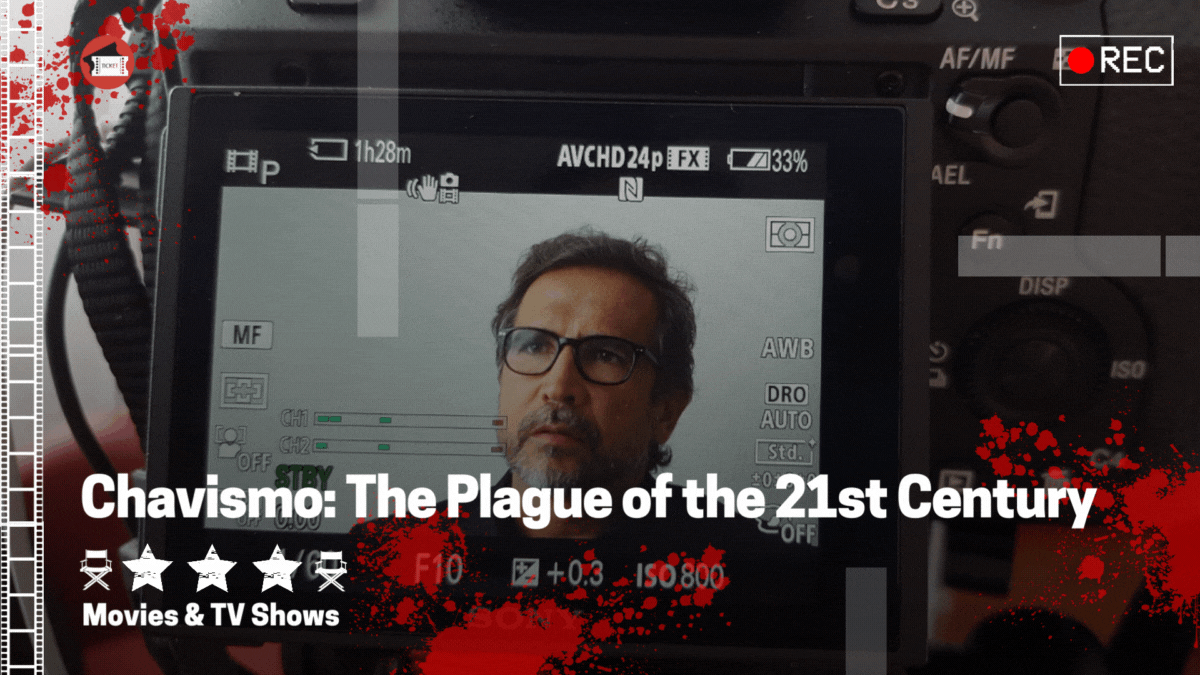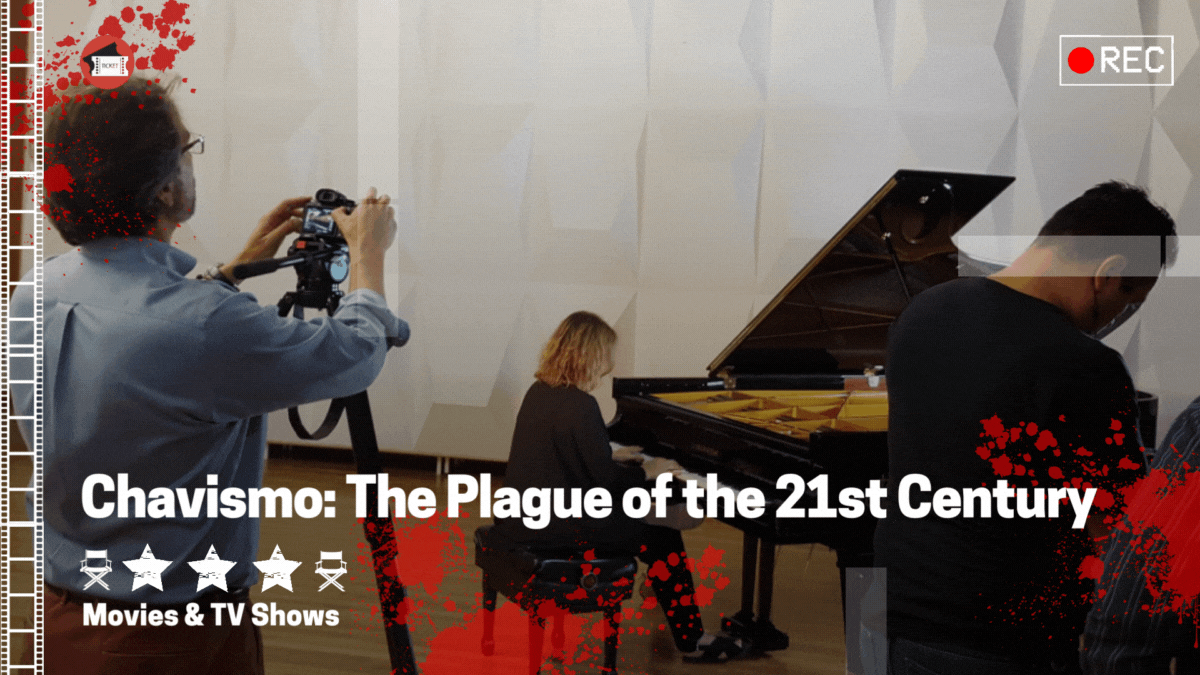Chavismo: The Plague of the 21st Century - The Collapse of the Great Oil Power! | Documentary Review [En-Es]
Power will always be afraid to fall. Chains and paralysis will only be an old memory of the past when they are completely broken.
El poder siempre tendrá miedo de caer. Las cadenas y la parálisis sólo será un viejo recuerdo del pasado cuando se rompan por completo.



In 2018, Gustavo Tovar Arroyo brought to the screens and to the world a short 93-minute documentary that visualizes Venezuelan reality (it is available on YouTube). The documentary depicts a deadly, grim and real tragedy. Those who watch it will say it is Grotesque, but it is only 1% of what happened and is happening in Venezuela.
When watching the documentary, despite having a position far from Gustavo Tovar Arroyo's, I applauded and applauded how he managed to bring such a crude context in a documentary that shows little by little between famous phases how Venezuela lost its social democracy (I describe it this way, since it was imperfect, bipartisan and with a single tendency).
The documentary highlights the origins of how Venezuela was wounded in 1992 and how politicians colluded to destroy institutionalism. Every scene is unrestrained, and this makes for a rich production. It is so rich that it depicts the reality of the West and how corruption caused the death of liberties in the country.
Venezuela is strange; I have always said this. One of the most accurate statements in the documentary is the following: "Venezuela's problem was moral". The documentary gradually explains why corruption, a lack of reform, centralism and the re-election of several presidents caused the population to wear out. Democracy itself is not capable of bringing about freedom. On the other hand, freedom is capable of generating democracy and a solid republic.
En el año 2018, Gustavo Tovar Arroyo llevó a las pantallas y al mundo un pequeño documental de 93 minutos que visualiza la realidad venezolana (éste se encuentra disponible en YouTube). El documental muestra una tragedia mortífera, tétrica y real. Para los que lo vean dirán que es dantesca, pero sólo es un 1% de lo que sucedió y ocurre en Venezuela.
Al visualizar el documental y a pesar de tener una posición lejana a la de Gustavo Tovar Arroyo, aplaudí y aplaudo cómo logró llevar un contexto tan crudo en un documental que muestra poco a poco entre fases célebres cómo Venezuela perdió su socialdemocracia (la describo de este modo; ya que era imperfecta, bipartidista y con una única tendencia).
El documental resalta el origen de cómo Venezuela fue herida en 1992 y cómo los políticos coludieron para destruir la institucionalidad. Cada escena no guarda ningún tipo de mesura y eso hace que sea una producción rica. Tan rica que describe una realidad de occidente y cómo la corrupción provocó la muerte de las libertades en el país.
Venezuela es extraña, siempre he dicho esto. Una de las aseveraciones más precisas en el documental es la siguiente: “El problema de Venezuela era moral”. El documental poco a poco te explica porqué la corrupción, la carencia de reformas, el centralismo y la reelección de varios presidentes provocó un desgaste en la población. La democracia en sí no es capaz de provocar la libertad. En cambio, la libertad sí es capaz de generar democracia y una república sólida.


Arrojo, among his interviewees, certifies that the population perceived aggravated political erosion in 1992. It is strange that a documentary is so clear and says that the problem was always in the hands of the same people. That problem nailed Venezuela's development and resulted in a regime consummated and coming to power in 1997. A man whose hands were stained with blood, who was the opposite and not the solution.
I say it again: the documentary has no restraint whatsoever. "I swear before this dying constitution" is the most horrifying sentence and the one that caused the progressive destruction of the country. A graphic description of who became president and dismantled the institutions.
Ingenuity or Idiocy? The latter, as described by Mario Vargas Llosa himself in his famous manual of the perfect Idiot (you know, the idiot always describes a preponderant enemy). Something interesting is that, sociologically, you have to define what Chavismo is, and the documentary clearly tells you that it is nothing but everything that is bad in humanity. Never the good, never the positive and ethical that characterizes society.
Arrojo, certifica entre sus entrevistados que la población percibía un desgaste político agravado en 1992. Es extraño que un documental sea tan claro y diga que el problema siempre estuvo en manos de la misma gente. Ese problema claustro el desarrollo de Venezuela y provocó como resultado que un régimen se consumara y llegara al poder en 1997. Un hombre que tenía manchado las manos de sangre, que era la contrariedad y no la solución.
Lo vuelvo a repetir: el documental no guarda ningún tipo de mesura. “Juro ante ésta moribunda constitución”, la frase más horrorosa y que ocasionó la progresiva destrucción del país. Una descripción gráfica sobre quién se convirtió en presidente y desmantelo las instituciones.
¿Ingenuidad o Idiotez? Lo segundo, como describe el mismo Mario Vargas Llosa en su célebre manual del perfecto Idiota (ya saben, el idiota siempre describe a un enemigo preponderante). Algo interesante es que sociológicamente hay que definir que es Chavismo, y el documental te dice claramente que no es nada, pero es todo lo malo de la humanidad. Nunca lo bueno, nunca lo positivo y lo ético que caracteriza a la sociedad.


Among the most famous people in the documentary are former Chilean president Sebastián Piñera, former Spanish president José María Aznar, former Mexican president Felipe Calderón Hinojosa, Nobel Prize winner Mario Vargas Llosa, Secretary of the Organization of American States Luis Almagro, former member of the board of directors of Petroleum de Venezuela Pedro Mario Burelli, former Venezuelan planning minister Ricardo Hausmann, among others. The number of people who make up the documentary are of different tendencies or ideals, but they end up describing the model that dominates Venezuela in the same way: a de facto regime.
What is most interesting? In the background is the song "Our Freedom" by Eva Rivera. The documentary was elaborated, showing the talent of the Venezuelans; there is a beautiful natural sequence that highlights Roraima Park and the Santo Angel (the highest waterfall in the world); the economy of the nineties; and the historical sequence of what Venezuela was and what it became. The format of the documentary is developed with interviews, but it is a sequential compilation of different arguments from people from Latin America, Spain and Venezuela.
Entre las personas más célebres dentro del documental están el expresidente chileno Sebastián Piñera, el expresidente español José María Aznar, el expresidente mexicano Felipe Calderón Hinojosa, el premio nobel de literatura Mario Vargas Llosa, el secretario de la organización de estados americanos Luis Almagro, el exmiembro de la junta directiva de petróleos de Venezuela Pedro Mario Burelli, el exministro de planificación venezolano Ricardo Hausmann, entre otros. La cantidad de personas que integran el documental son de diferentes tendencias o ideales, pero que terminan describiendo el modelo que domina Venezuela de la misma manera: régimen de facto.
¿Qué es lo más interesante? En el fondo la canción de Nuestra Libertad de Eva Rivera. El documental se elaboró mostrando el talento de los venezolanos, hay una secuencia natural hermosa que enaltece parque Roraima y el Santo Ángel (la cascada más alta del mundo), la economía de los noventa, la secuencia histórica de lo que era Venezuela y en lo que se convirtió. El formato del documental es desarrollado con entrevistas, pero es una recopilación secuencial de argumentos diversos de personas de Latinoamérica, España y Venezuela.



Eva Rivera's song is heard in the most transcendental moments and shrinks the heart. We have suffered a lot; we have cried and screamed a lot. No one but us knows what has happened. The truth is that while we try to make a life, smile and survive, there is something that weighs; it's there, and we don't show it because it hurts.
It's not victimhood or anything close to it. It is reflection... The documentary shows how we have suffered so far, how we lost friends, how we saw our families live in waves of migration never seen before, and how the dehumanization began without anyone being able to stop it.
Eva Rivera's song and this documentary by Gustavo Tovar Arroyo prove that they can never imprison us. Freedom is destiny. One of the most dramatic issues that can be visualized is the oil industry. Far from being a benefit, it has become an addiction. There is much to see, say, analyze and predict.
If you want to know how the richest country in Latin America became what it is today, a small sample of those facts is elucidated in this documentary. Again, I don't share the same views as the director, but it uncovers an ideological stench very well.
La canción de Eva Rivera se escucha en los momentos más transcendentales y achican el corazón. Mucho hemos sufrido, mucho hemos llorado y gritado. Nadie más que nosotros sabemos lo que ha ocurrido. La verdad es que mientras tratamos de hacer una vida, sonreír y sobrevivir existe algo que sopesa, está ahí y nosotros no lo mostramos porque duele.
No es victimismo, ni algo cercano a ello. Es reflexión… El documental desprende cómo hemos sufrido hasta ahora, cómo perdimos amigos, vimos marchar a nuestras familias en olas migratorias nunca antes vistas y cómo la deshumanización comenzó sin que nadie le pudiera parar.
La canción de Eva Rivera y este documental de Gustavo Tovar Arroyo aciertan en que nunca podrán encarcelarnos. El destino es la libertad. Uno de los temas más dramáticos que se pueden visualizar es la industria petrolera, lejos de ser un beneficio, se convirtió en adicción. Mucho que ver, decir, analizar y predecir.
Si deseas saber cómo el País más rico de Latinoamérica llegó a convertirse en lo que es hoy, una pequeña muestra de esos hechos los dilucida este documental. Lo reitero no comparto las mismas visiones que el director, pero desviste una peste ideológica muy bien.
Translation | Traducción : DeepL.


https://inleo.io/threads/neruel/re-neruel-2gph4vb5j
The rewards earned on this comment will go directly to the people ( neruel ) sharing the post on LeoThreads,LikeTu,dBuzz.
si no mal recuerdo habia escuchado de ese documental, solo que nunca lo vi y al final lo termine olvidando. todo lo que dijiste, me dieron ganas de darle un ojo, aunque vivamos esta realidad, a veces hay cosas que pasamos por alto.
un abrazo.
Es un documental crudo que muestra una parte de todo lo que ha ocurrido. Deberías darle la oportunidad y visualizarlo.
Voy a buscar ese documental para detallarlo. Lo que los venezolanos hemos vivido durante este periodo gubernamental es algo inusual. Pero me ha llamado la atención nuestra capacidad de aguante. En otros países apenas cambian una ley y ya la gente sale a la calle a protestar. Aquí el que proteste va preso, con varios cargos inventados. Democracia disfrazada. Gracias por el dato